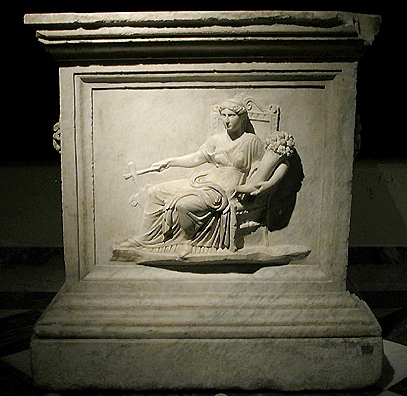Cultus Fortunae
Home | Latíné | Deutsch | Español | Français | Italiano | Magyar | Português | Română | Русский | English
⚜⚜⚜ Site Index - Key Pages ⚜⚜⚜
Fortuna, the goddess of fertility, abundance, and bringer of success, had been worshipped since remote antiquity in Italy. According to tradition, her worship was introduced into Rome by king Servius Tullius, popularly believed to be her favourite and confidant. He was said to have founded her oldest sanctuaries, of Fors Fortuna, on the right bank of the Tiber below Rome. To this a pilgrimage was made down the stream by land and water on the anniversary of its foundation a.d. VI Kal. Quin. ‡.
The worship of Fortuna spread and became one of the most popular in Italy. She was worshipped at a great number of shrines under various titles, given by her aspects. The greatest was Fortuna Primigenia, primordial Fortune, whose oracular temple in Praeneste was famous & one of the largest in the ancient world, and this Fortuna as Fortuna Publica or Populi Romani, was the tutelary goddess of the state.
Fortuna was a favourite with soldiers. More than a dozen altars to her have been found in Britain, on which she is addressed simply as Fortuna, or as Fortuna Conservatorix and Fortuna Redux; while on one at Chesterholm she appears as Fortuna Populi Romani, the tutelary goddess of the Roman people.
Fortuna Primigenia was the great mother goddess of the city Praeneste. III Id. Aprilis the oracle would be open to worshippers, as is documented in the Praenestine Fasti. This was the most famous oracle in all of Italy. Trajan founded a special temple in honour of Fortuna as the all-pervading power of the world. Here an annual sacrifice was offered to her on New Year's Day.
Remains of the Aedes Fortunae Huiusce Diei (Temple of the Fortune of This Day) may be seen in the Largo di Torre Argentina archeological area in Roma.
Contents |
Ovid, Fasti vi (773‑786)
quam cito venerunt Fortunae Fortis honores!
post septem luces Iunius actus erit.
ite, deam laeti Fortem celebrate Quirites!
in Tiberis ripa munera regis habet.
pars pede, pars etiam celeri decurrite cumba;
nec pudeat potos inde redire domum.
ferte coronatae iuvenum convivia lintres,
multaque per medias vina bibantur aquas.
plebs colit hanc, quia, qui posuit, de plebe fuisse
fertur et ex humili sceptra tulisse loco.
convenit et servis serva quia Tullius ortus
constituit dubiae templa propinqua deae.
ecce suburbana rediens male sobrius aede
ad stellas aliquis talia verba iacit.
Plutarch, On the Fortune of the Romans
[S]wift is the pace of Fortune, bold is her spirit, and most vaunting her hopes; she outstrips Virtue and is close at hand. She does not raise herself in the air on light pinions, nor advance "poised on tip-toe above a globe," in precarious and hesitant posture, and then depart from sight. But even as the Spartans say that Aphroditê, as she crossed the Eurotas, put aside her mirrors and ornaments and her magic girdle, and took a spear and shield, adorning herself to please Lycurgus, even so Fortuna, ... when she was approaching the Palatine and crossing the Tiber, it appears that she took off her wings, stepped out of her sandals, and abandoned her untrustworthy and unstable globe. Thus did she enter Rome, as with intent to abide, and in such guise is she present to‑day...
Attributes
In works of art Fortuna was variously represented in Praeneste as nursing the twins Juno and Juppiter, in Rome holding a cornucopia, signifying abundance and later throughout the Empire (having merged with the Greek Tyche, goddess of chance), she is represented holding not only her cornucopia but also syncretically the rudder and mural crown of Tyche, and sometimes the horns of Isis.
See Also
- Fortuna Populi Romani Quiritium Primigenia Article about Fortuna Populi Romani Quiritium Primigenia.
- Aedes Fortunae Huiusce Diei Article about archeological remains in Rome.
- Aedes Fortunae Populi Romani Quiritium Primigenia (Nova Roma) Nova Roma online Temple to Fortuna Populi Romani Quiritium Primigenia.
References
- Ward, Roman Era in Britain
- Plutarch: De Fortuna Romanorum
- Champeaux,"Fortuna"
